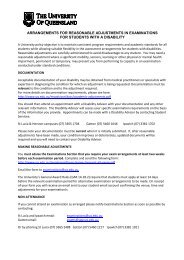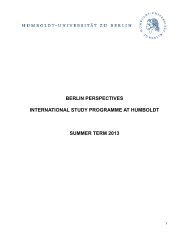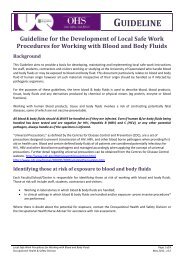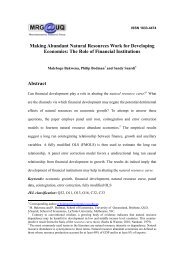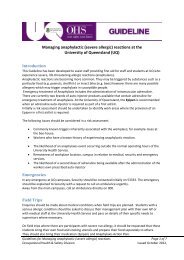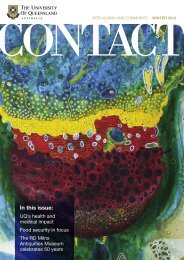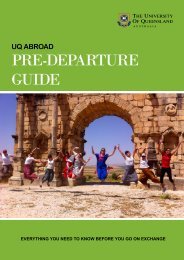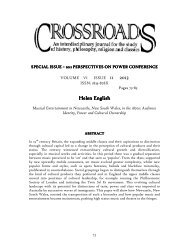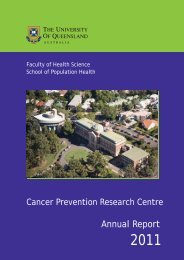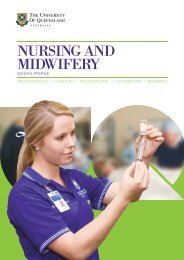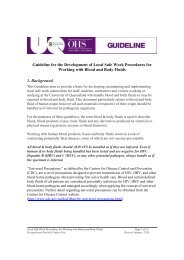Review of the Social Capital Literature - University of Queensland
Review of the Social Capital Literature - University of Queensland
Review of the Social Capital Literature - University of Queensland
Create successful ePaper yourself
Turn your PDF publications into a flip-book with our unique Google optimized e-Paper software.
o<strong>the</strong>rs as mean, selfish or unreliable. This measure consists <strong>of</strong> items describingperceptions <strong>of</strong> specific hypo<strong>the</strong>tical interpersonal situations, ra<strong>the</strong>r than askingrespondents to describe <strong>the</strong>ir own general behaviour.Among <strong>the</strong> more specific social capital measures <strong>of</strong> trust a common approachhas been to utilise GSS survey data. Various studies have used data relating to<strong>the</strong> questions in this survey relating to trust, in attempts to obtain a generalisedview <strong>of</strong> <strong>the</strong> general climate <strong>of</strong> trust in a community. The two items mostfrequently used are‘Generally speaking, would you say that most people can be trusted, or that youcan’t be too careful in dealing with people?’‘Do you think most people would try to take advantage <strong>of</strong> you if <strong>the</strong>y got achance, or would <strong>the</strong>y try to be fair?’Examples <strong>of</strong> research using this measure <strong>of</strong> trust include Kawachi, Kennedy etal. (1997) and Kennedy, Kawachi et al. (1998) (see section 4 below).Ano<strong>the</strong>r specific attempt to measure trust as a component <strong>of</strong> social capital hasbeen to use an experimental method. Glaeser et al attempt to do this byconducting experiments with monetary awards in order to measure trust andtrustworthiness (Glaeser, Laibson et al. 2000).Survey questions were asked <strong>of</strong> a sample <strong>of</strong> Harvard undergraduates, coveringdemographic and behavioural questions, as well as attitudinal and self-reportedbehavioural measures <strong>of</strong> subjects’ trustfulness and trustworthiness. This wasfollowed by participation in two ‘trust’ games. The first experimental trust gameinvolves subjects working in pairs. The first subject is given <strong>the</strong> opportunity tosend <strong>the</strong>ir partner an amount <strong>of</strong> money between 0 and 15 dollars. This chosenamount is doubled by <strong>the</strong> experimenter, and given to <strong>the</strong> second player. Thesecond player may <strong>the</strong>n return money back to <strong>the</strong> first player. Glaeser et albelieve that <strong>the</strong> amount sent by <strong>the</strong> sender is a na tural measure <strong>of</strong> trust, as <strong>the</strong>sender trusts <strong>the</strong> recipient to return a fair share <strong>of</strong> <strong>the</strong> amount sent. They alsobelieve that, controlling for <strong>the</strong> amount sent, <strong>the</strong> amount returned is a measure <strong>of</strong>trustworthiness.In <strong>the</strong> second experimental game, subjects report valuations for a series <strong>of</strong>‘envelope drops’. Envelopes, containing $10 and addressed to <strong>the</strong> subjects, willbe dropped by <strong>the</strong> experimenters in different public places and under differentconditions. For each place and condition <strong>the</strong> subject reports a valuation. If a highvalue is placed on <strong>the</strong> dropped envelopes, <strong>the</strong> researchers inferred that <strong>the</strong>subject was more likely to trust strangers to return <strong>the</strong> envelopes.The results showed that standard attitudinal survey questions about trust predicttrustworthy behaviour in <strong>the</strong> experiments much better than <strong>the</strong>y predicted trustingFebruary 2001 DRAFT ONLY 14


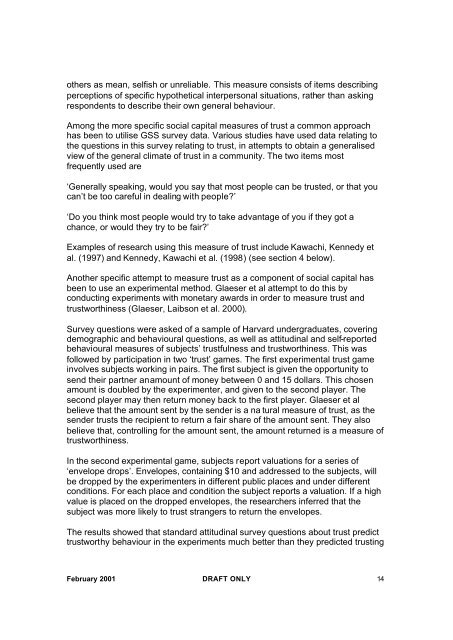
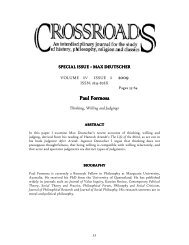
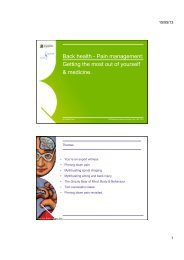
![Recycling [ PDF, 62KB ] - University of Queensland](https://img.yumpu.com/51805185/1/184x260/recycling-pdf-62kb-university-of-queensland.jpg?quality=85)
